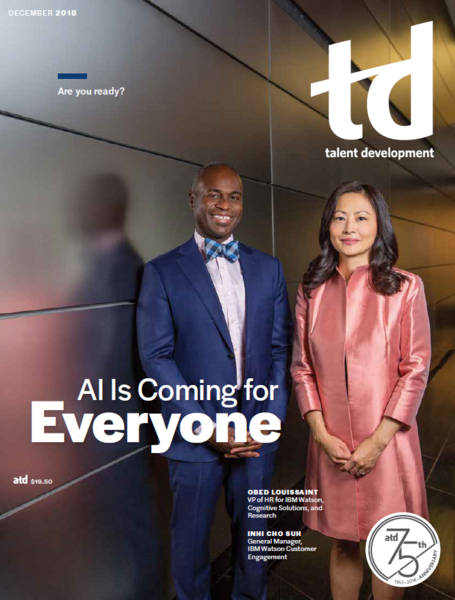TD Magazine Article
AI Is Coming for Everyone
Are you ready?
Mon Dec 03 2018

Bookmark
Cognitive computing is transforming industries and the roles of those who work in them. In this interview, Inhi Cho Suh, head of IBM Watson Customer Engagement, takes us into a future where humans and machines will have huge learning requirements.
You've said that cognitive computing, combined with augmented intelligence, will change every profession and every industry. That disruption has already begun. Where do you think it will have the most effect?
We've already seen great adoption of augmented or artificial intelligence (AI) in a couple of areas in the last 18 months. The first category is AI for professionals, and it's happening around customer service and engagement. AI is augmenting the capabilities of reps by giving them a holistic view in real time of all the information available about a customer or a client.
One example would be the Royal Bank of Scotland, where we helped create a virtual agent that complements their call center professionals. Another example is Autodesk's virtual agent, AVA. "She" has reduced response times, particularly for clients with questions about the company's products and services, from almost two days down to minutes.
The second area where we're seeing amazing traction is AI for supply chain professionals. In early 2018, we released a new capability called Supply Chain Insights. It reveals things like inbound risk of inventory and supply chain disruptions. It knows the status of an order and can also bring together the right people, systems, and data to help the supply chain expert respond quickly in real time.
AI is also transforming the work of marketing professionals. We've embedded AI in our Watson Campaign Automation tool, which allows personalization of email, SMS, and social media marketing. It not only helps build a campaign but also analyzes its efficacy by revealing what segments of a target population responded well.
What new capabilities will humans need to be able to leverage AI and cognitive computing?
There will be a transformation of the workforce in terms of skills. First, AI will drive the need for talented individuals who are curious and continuous learners, because the pace of technology is incredibly fast. Half the jobs that exist now didn't exist 10 years ago.
We're at such a nascent stage in cognitive computing that everybody needs to learn about it, not just people in the tech industry. People in every role, every profession, and at every level should really understand the terminology and the possibilities of AI and start to get engaged.
In the consumer world, more than 50 percent of the population is already interacting with AI through features like targeted ads and chatbots, but many people don't realize it. I think all institutions need to be transparent in how they apply AI. Leading institutions and especially vendors must create trust in AI.
Speaking of trust, in the wake of the European Union's General Data Protection Regulation, people are more aware of data privacy. We're learning that the more that computer systems know about us, the more our autonomy and privacy may be at risk. What are your thoughts about building responsible technology?
When we think about current and future AI technology, we need to make sure that we have diverse populations training AI systems. We don't want one tribal group or a narrow set of individuals training AI systems that have huge impacts on society, government, and business.
When you look at the skill supply for the top AI training jobs, only a couple of countries are participating. I think we need to make sure that there is more diversity of intention for AI and that we do more to mitigate unconscious biases in developing algorithms and decision-making criteria for AI. It's incumbent on everyone to participate, not just people in Silicon Valley.
How do you think AI may change the practice of talent development?
It's already changed talent development at IBM. We have an AI-powered program called Your Learning, which personalizes employees' learning based on their skills and where they are on a spectrum of knowledge.
IBM, working with leading experts, has conceptualized and created an AI Academy for IBMers to develop skills, both for the creation and industry application of AI.
On average in 2018, IBMers spent about 65 hours in training not just on AI but other technologies such as blockchain, cybersecurity, and intelligence. And we have a program called Digital Badge for AI. IBMers who took a combination of classes this year earned over 700,000 badges.
Companies can't hire the AI talent they need right now because the supply is smaller than the demand, so every company, especially those in the tech industry, needs to train the workforce in AI.
Data preparation has proved challenging for some companies trying to implement AI. What advice do you have for preparing employees to work in a data-driven world? What specific skills do organizations need for implementing cognitive computing?
Getting into AI is not just about getting some software developers, data scientists, and AI experts to start building something. You have to decide what problem you're trying to solve and why you're trying to solve it with AI.
When you're building and applying systems that leverage AI, creating a system that people can trust to make decisions is really important. It starts with your data policies. Do you own the data? Do you have rights to the data? How transparent are you going to be in the training of AI?
The second important thing is explainability. Can you explain the algorithms that will be used and how they will be combined to guide decision making?
The third piece is governance. What roles and which people will be part of the training methodology for AI and part of creating the decision practices? What value do you want to achieve by applying AI?
When you can do all that, then you can get started.
Because we're at a nascent stage in applying AI pervasively, it's very important for people to document what they're doing in those three areas. That will take you a long way to being able to make corrections later.
A Massachusetts Institute of Technology report predicts that in the future, all employees will be sustainers, explainers, or trainers of AI. What's your view of the future relationship of humans to AI in the workplace?
There will be some jobs that get displaced, but I believe a lot more jobs will be created. That's happened over and over since the Industrial Revolution and the advent of technology. The future workplace will be a combination of humans and machines. And our belief is that AI will augment every profession.
At the Royal Bank of Scotland, where we helped develop a virtual agent, AI didn't eliminate jobs—it made them easier. The reps could be more efficient and respond more quickly. We've learned that when reps work with systems that can give them a holistic view of a customer, they feel more empowered to get to an outcome.
You used the word nascent to describe the state of the AI industry. When do you think AI will reach critical mass?
It's nascent, but it's growing incredibly fast. We've seen quite an acceleration of use in the consumer advertising and marketing worlds. But in the broader enterprise world and other professions and roles, I believe probably in the next five years.
To become involved in AI, you have to consciously commit. Then you have to learn about it, read about it, and get skilled. If you wait too long, I think you'll lose your competitiveness in whatever profession you're in.
What's your opinion about regulating AI so that it doesn't turn on humans, as people such as Stephen Hawking and Elon Musk have warned?
General AI is still multiple decades away. Specialized AI by industry and profession will happen faster because AI trains (or learns) fast when the data set is specific and the questions are narrow in terms of guidance.
It starts with intentional design—designing a system from the very beginning to augment human capabilities. It's important to remove unconscious biases from the system as you train it to make decisions. Systems designed this way will be the ones that are more often adopted.
Your position as general manager of a large tech organization makes you part of a small group of women leading large companies. That group has always been small, and in 2018 it got 25 percent smaller, according to this year's Fortune 500 list. What are the biggest obstacles women, or their employers, need to overcome to improve this situation, especially in the tech sector?
IBM has a long history of diversity and inclusion and a track record for over 100 years of being very progressive in that. Nevertheless, my belief is that we all could do more as entire industries, both in business and tech, to have more women in the pipeline. It starts there first, even before you get to the C-suite. The percentage of women in the leadership pipeline for tech is roughly 26-27 percent. As women progress to upper levels of management and executive roles, that percentage dwindles even further.
After the pipeline comes progression. In my view, there are a lot of programs you can do to improve both. At IBM, we have the Tech Eminence Program for women wanting to be in STEM \[science, technology, engineering, and mathematics\] careers. More than 1,000 women have gone through this program, which pairs women with mentors and ensures that they get the right opportunities to grow in their careers.
The second is a program called Tech Re-Entry. It's a 12-week internship for women who have left tech careers for a variety of reasons but want to come back into computer science or other tech fields. The program helps qualified women gain intensive understanding of the newest technologies, including blockchain, cybersecurity, AI, and quantum computing.
One of the women who completed the program and reentered the workforce after more than 10 years is now part of our quantum computing research team.
I also believe that the tech industry and the VC \[venture capital\] community must be much more open and diverse in terms of the selection process for women and underrepresented minorities.
What Is Cognitive Computing, and Who Is Watson?
IBM's Watson, named after IBM's first CEO, industrialist Thomas J. Watson, is an artificial intelligence (AI) platform for business, powered by data. As an AI system, Watson can turn unstructured business data into actionable insights that enhance decision making. It uses AI technologies such as data mining, pattern recognition, and natural language processing to mimic the way the human brain works.
Cognitive systems rely on deep-learning algorithms and neural networks to process information by comparing it with a teaching set of data. The more data the system compares, the more it learns and the more accurate it becomes. Feeding data to cognitive computing systems is often called training AI, a job that more people will be doing in the future.
Watson became famous in 2011 by defeating two experts on the TV game show Jeopardy. Since then, IBM has accelerated innovation, advancing and scaling the Watson platform and applying the technologies to many industries, including health, Internet of Things, customer engagement, education, cybersecurity, finance, and industry solutions.

More from ATD

